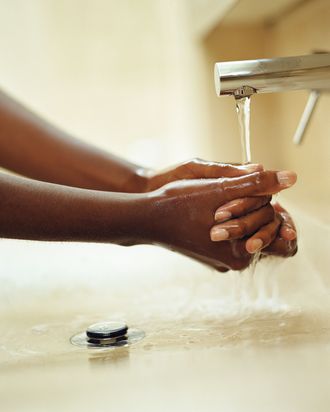
Hand-washing has a surprisingly ignoble history. The 19th-century Hungarian pathologist Ignaz Semmelweis was chastised and ignored when he told surgeons that they should wash their hands and instruments with a chlorine solution between examining corpses and delivering babies. (He eventually died in an insane asylum. Of infection.) Things are better now, but it’s still hard to get people — even doctors! — to take hand-washing seriously; the CDC says that providers of health care clean their hands “less than half” of the times they that should, and an estimated 1 in 25 patients visiting a hospital will get some sort of health-care-related infection. Which is a way of preparing you for a brutal truth: Like love, poop, actually, is everywhere.
This was a finding I discovered while interviewing New York University pathologist Philip Tierno about the merits of toilet paper. (A breakthrough, he said, since there was “no standardization of hygiene” in the U.S. before TP.) But toilet paper is a manual technology; unlike the fancy bidets that are increasingly en vogue, toilet paper is a hands-on method for cleaning things up. While it’s a way of cleaning, it is not necessarily clean, especially in the tragic cases when toilet paper breaks and, in the words of one poop scholar, “you’re confronted with your own mortality … right on your fingers.” The comedian George Carlin, in his skewering of the American fear of germs, loudly declared that he only washes his hands in this case — when there’s shit on his hands.
Apparently many people share Carlin’s view. Tierno says that in his 40 years of working at the New York University Langone Medical Center, he has taken sample cultures from myriad surfaces, from bar tops to forks to knives to glasses. And if you live in the country, you’re not more safe from poop: There’s 130 times more waste produced by animals than humans in the U.S., and research suggests it’s especially present in dry, windy, farmland-filled states like Texas and Missouri. “You find feces everywhere,” Tierno says. “It tells me people aren’t washing their hands, and if they are, they’re not doing it correctly. That’s why, as a society, there’s a lot of fecal contamination.”
Not that you should be extremely worried about all that poop, Tierno continued, probably sensing my fear. Because if there aren’t any pathogens in a given feces, he says, “you can spoon-eat feces without any deleterious effect.” While the world may be “covered in a fine patina of feces,” as one Stanford microbiologist observed, you’re mostly okay unless there are pathogens in there.
But if you want to avoid getting all that feces — and any pathogens handing out in there — all up in your body, Tierno says to be especially careful with your hands. While you can’t control a stranger sneezing in your face on the subway — one of the main ways New York says “I love you” — you can control what you do with your hands. So if you’re touching things that could be fecal-contaminated (i.e., everything), absolutely do not put your digits on the main avenues of entry for your body.
“Contaminate your hands as much as you want,” he says, “but don’t touch your mouth, eyes, or nose.” That’s why before you, for instance, take your contacts out, wash your hands thoroughly. (Washing them improperly is almost as bad as not washing at all, he warns). The right wash is with soap (admit it, sometimes you skip): Wash in between your fingers, get into your nail beds and under your nails — Tierno recommends working up some suds in one palm and then scraping your nails into that little suds cup. If you’re dutiful about hand-washing — like doing so before you sit down at your office, before you eat, and the like — you’ll get less sick. “We’re talking about common sense, avoiding illness from pathogens,” he says. “You want to avoid access to your body to these organisms.”




